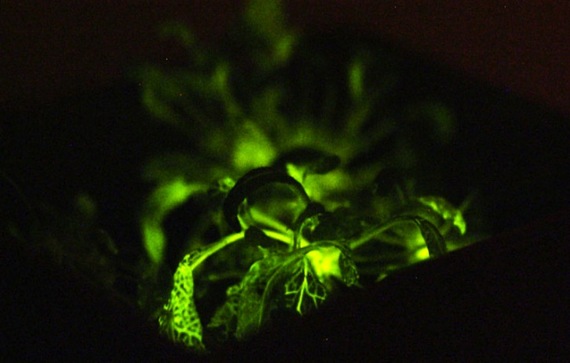Image via Glowing Plant
By Antony Evans
Synthetic biology is entering an exciting new phase. An ecosystem of companies is now developing services to enable faster, cheaper, and better genetic engineering. They are, in effect, "digitizing" genetic engineering through relatively inexpensive cloud-based and robotic laboratories that bring capabilities that were once the exclusive domain of large corporations to academic groups and small startups.
To use an old computing analogy, this is biotech's PC moment: Digitization allows those without technical expertise to operate at higher, more abstract levels. The digital keys to synthetic biology--reproducibility and protocol sharing--could make biological apps as easy to develop as mobile apps are today. Currently, implementing and optimizing a new experiment in a conventional lab can take a Ph.D.-level researcher weeks or months. Once digitized, however, anyone anywhere in the world can implement such a protocol without such extensive training--adopting a new protocol becomes relatively simple.
My company's aim is to extend these new digital capabilities to the work of engineering plants. As a proof of principle, our first product is, literally, a "Glowing Plant." To create it, we integrated a suite of technologies that allows us to design, test, and optimize multigene pathways in plants. To make a plant "glow" is of course just one of an infinite variety of alterations that might be possible.
We've recently started making our system available to a select group of alpha partners to make their own apps. In the future, we hope anyone--from teenagers to grandmas--will be able to use our platform to make a genetically engineered plant with novel characteristics and send it out into the world--as a business or for fun. What people will create with these technologies will be limited only by their imagination. As with other technologies that became democratized, this one will open up a breathtaking world of creativity, innovation, and possibility (for an example see "Color-Changing Flowers," currently fundraising on Indiegogo).
Part of what makes our business possible in the U.S. is the regulatory environment. The Coordinated Framework for Biotechnology was developed around the principle that the product, not the process, should be regulated. This principle is robust and based on solid scientific evidence.
As a result, plants are regulated under the existing USDA plant regulations that prevent the introduction of noxious weeds or plant pests. If there is no reason to suspect a new plant to be either of those things, then the product will not be regulated by the Animal and Plant Health Inspection Service (APHIS)--a confirmation we recently received from APHIS for our first version of the Glowing Plant.
This antagonizes anti-GMO activists, who are ideologically opposed to the technology and love difficult regulatory barriers, as well as large corporations, which likewise want barriers to entry, along with the policy wonks paid by them, who call it a "loophole."
But it's a position that flows logically from the regulate-the-product-not-the-process principle: Either we should regulate all new plants--whether products of conventional mutation breeding, wide crosses (forcing distantly related species to breed) or recombinant DNA techniques--or we should just regulate the problematic weeds and pests as we currently do.
The product-not-the-process regulatory principle is not shared by other nations. In particular, proposed synthetic biology regulations in the UN Convention on Biological Diversity (CBD) could make this kind of app-based bioeconomy impossible due to the cost and time burden of regulatory compliance. As a consequence the U.S., which hasn't signed the CBD, is likely to dominate this burgeoning industry and reap the significant returns it will make possible for both business and society
The next few years are going to be an exciting time for plant engineering. If you've got an idea you'd like to see come to life, or if you want to learn more about how our idea is taking root, so to speak, visit glowingplant.com or reach out and talk to me at antony@glowingplant.com.
Original post published at Techonomy.com.
